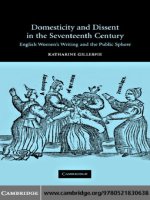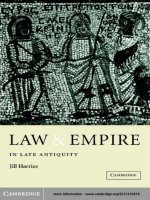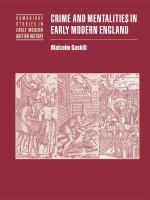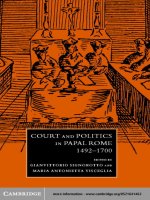0521854407 cambridge university press ethics and nostalgia in the contemporary novel dec 2005
Bạn đang xem bản rút gọn của tài liệu. Xem và tải ngay bản đầy đủ của tài liệu tại đây (1.52 MB, 236 trang )
This page intentionally left blank
ETHICS AND NOSTALGIA IN THE
CONTEMPORARY NOVEL
Images of loss and yearning played a crucial role in literary texts
written in the later part of the twentieth century. Despite deep
cultural differences, novelists from Africa, the Caribbean, Great
Britain, and the United States have shared a sense that the economic,
social, and political forces associated with late modernity have
evoked widespread nostalgia within the communities in which they
write. In this original and wide-ranging study, John J. Su explores
the relationship between nostalgia and ethics in novels across the
English-speaking world. He challenges the tendency in literary studies to portray nostalgia as necessarily negative. Instead, this book
argues that nostalgic fantasies are crucial to the ethical visions presented by contemporary novels. From Jean Rhys to Wole Soyinka
and from V. S. Naipaul to Toni Morrison, Su identifies nostalgia as
a central concern in the twentieth-century novel.
j o h n j . s u is Assistant Professor of English at Marquette University. He has previously published in such journals as Modern Fiction
Studies, Contemporary Literature, and Modern Drama.
ETHICS AND
NOSTALGIA IN THE
CONTEMPORARY
NOVEL
JOHN J. SU
camʙʀɪdɢe uɴɪveʀsɪtʏ pʀess
Cambridge, New York, Melbourne, Madrid, Cape Town, Singapore, São Paulo
Cambridge University Press
The Edinburgh Building, Cambridge cʙ2 2ʀu, UK
Published in the United States of America by Cambridge University Press, New York
www.cambridge.org
Information on this title: www.cambridge.org/9780521854405
© John J. Su 2005
This publication is in copyright. Subject to statutory exception and to the provision of
relevant collective licensing agreements, no reproduction of any part may take place
without the written permission of Cambridge University Press.
First published in print format 2005
ɪsʙɴ-13
ɪsʙɴ-10
978-0-511-13539-2 eBook (EBL)
0-511-13539-4 eBook (EBL)
ɪsʙɴ-13
ɪsʙɴ-10
978-0-521-85440-5 hardback
0-521-85440-7 hardback
Cambridge University Press has no responsibility for the persistence or accuracy of uʀʟs
for external or third-party internet websites referred to in this publication, and does not
guarantee that any content on such websites is, or will remain, accurate or appropriate.
Contents
Acknowledgments
page vi
Introduction: nostalgia, ethics, and contemporary
Anglophone literature
1
1
Narratives of return: locating ethics in the age of globalization
20
2
Nostalgia and narrative ethics in Caribbean literature
53
3
“Loss was in the order of things”: recalling loss,
reclaiming place in Native American fiction
89
Refiguring national character: the remains of the
British estate novel
119
Appeasing an embittered history: trauma and nationhood
in the writings of Achebe and Soyinka
140
4
5
Conclusion: nostalgia and its futures
173
Notes
Bibliography
Index
180
212
224
v
Acknowledgments
While it is a standard convention to assert that a book would not have
been possible without the help of many others, this is perhaps more
literally true in my case than in most. In the years before voice-recognition
technology was widely available, I was heavily dependent on the generosity of others to be my “hands.” And so these people by right deserve my
first thanks. While I cannot list and do not even know all the people who
have typed for me over the past twelve years, I would particularly like to
thank Ruth Roland, Alan Terlep, and my brothers William, Lawrence,
and Robert Su. If to type for me means to love me, then they have loved
me greatly. I would also like to recognize Jim Knox of the Adaptive
Technology Site at the University of Michigan for introducing me to
voice-recognition technology.
I have a great many intellectual debts to acknowledge as well. First and
foremost, I would like to thank my dissertation committee at the University of Michigan for their tireless support, generosity, and assistance.
Tobin Siebers, Simon Gikandi, Betty Louise Bell, and Margaret Somers
have been and continue to be inspirations for me as a teacher and writer,
and I hope some day to justify the countless hours they have invested
in my education. Toby, above all, deserves my thanks. Any success I
have had as a scholar can be attributed to his mentorship; any failures
I have had I can only claim as my own. I would also like to express my
gratitude to my colleagues at Marquette University, who have helped me
to make Milwaukee a happy home these past four years. In particular, I
would like to thank Tim Machan and Michael Gillespie for their support
and friendship. A Summer Faculty Fellowship granted by Marquette was
also helpful in providing time for me to write. Among the many others
who have read and commented on parts of this manuscript, I would like
especially to thank Andrew Sofer, Michael Lackey, Apollo Amoko, and
Cynthia Petrites.
vi
Acknowledgments
vii
Finally, I would like to thank all my friends and family for their
generous tolerance and unquestioning support of a project that has been
my personal obsession over the past few years. Above all, I owe everything
to Cindy, who has patiently read multiple drafts of chapters and offered
me friendship and love. I hope to be able to return in some measure the
gifts I have received from her.
Parts of this manuscript have appeared elsewhere in printed form. An
earlier version of my discussion of Ian McEwan and three other paragraphs from Chapter One appeared as “Haunted by Place: Moral Obligation and the Postmodern Novel,” in Centennial Review 42.3 (1998),
589–616. A previous version of the sections devoted to Jean Rhys and a
few other paragraphs in Chapter 2 appeared as “‘Once I Would Have
Gone Back . . . But Not Any Longer’: Nostalgia and Narrative Ethics in
Wide Sargasso Sea,” in Critique 44.2 (2003), 157–74. An earlier version of
Chapter 4 was previously published as “Refiguring National Character:
The Remains of the British Estate Novel,” in Modern Fiction Studies 48.3
(2002), 552–80.
Introduction: nostalgia, ethics, and contemporary
Anglophone literature
nostalgia
The longing to return to a lost homeland becomes a central feature of
the Western literary tradition long before the term “nostalgia” was coined
to describe it.1 Homer’s first image of Odysseus is of him sitting alone on
the island of Ogygia, weeping, pining for his beloved Ithaca. Despite
offers by the goddess Calypso to take him as a spouse and grant him
immortality, Odysseus desires nothing more than to return to the place of
his birth – even after Calypso foretells of the hardships he must bear
before reaching his home. This first “narrative of return” establishes a
pattern that continues to compel writers even now in the twenty-first
century. In the past century, some of the most distinguished Anglophone
writers from across the globe have rewritten the Homeric tale, including
the expatriate Irishman James Joyce, the St. Lucian Derek Walcott, and
the American Charles Frazier. Long after it has become cliche´ to say that
“you can’t go home again” – long after it has become widely recognized
that nostalgic homelands frequently exist only in the imagination –
literary texts continue to depict characters defined by their longing to
return.
Although twentieth-century literary texts share the Homeric preoccupation with lost homelands, they are produced in environments in
which nostalgia is subject to stark criticism. Perhaps the most widely
cited academic study of nostalgia, Susan Stewart’s On Longing: Narratives
of the Miniature, the Gigantic, the Souvenir, the Collection, characterizes it
as a “social disease.”2 What began in the seventeenth century as a physiological disease had become in the twentieth century a social ailment that
leads to an obsession with kitsch and heritage in its most benign forms
and fascism in its most extreme versions. Nothing in The Odyssey suggests
that Odysseus should be faulted for his longing to return to his homeland;
to the contrary, his crew criticize the inadequacy of his longing as he
1
2
Ethics and Nostalgia in the Contemporary Novel
tarries on the island of Circe. But in the contemporary Western world, a
diagnosis of nostalgia typically earns a writer or scholar condemnation; to
be nostalgic is to be “out of touch,” reactionary, even xenophobic. As
Jackson Lears notes, nostalgia continues to be “the beˆte noire of every
forward-looking intellectual, right, left, or center.”3 Unlike nostalgia in
the Homeric world, which drives Odysseus to remember his past despite
the lures of Calypso, nostalgia in the twentieth century is characterized as
a form of amnesia. Thus, despite the surging interest in topics relating to
memory within the humanities over the past two decades, the analysis of
nostalgia has largely been neglected. To the extent that it enters such
discussions, it typically functions as a foil. “Memory” signifies intimate
personal experience, which often counters institutional histories; “nostalgia” signifies inauthentic or commodified experiences inculcated by capitalist or nationalist interests. Indeed, cultural critics like bell hooks have
insisted that the study of memory demands a rigorous rejection of
nostalgia, calling for a “politicization of memory that distinguishes nostalgia, that longing for something to be as it once was, a kind of useless
act, from that remembering that serves to illuminate and transform the
present.”4
Such dismissals of nostalgia, however, risk occluding crucial aspects of
contemporary Anglophone literature. Memory and nostalgia are intertwined, for example, in one of the most widely studied works written in
recent decades, Toni Morrison’s Beloved (1987). Early in the novel, the
protagonist Sethe discovers that even the plantation on which she was a
slave evokes a certain nostalgia: “and suddenly there was Sweet Home
rolling, rolling, rolling out before her eyes, and although there was not a
leaf on that farm that did not make her want to scream, it rolled itself
out before her in shameless beauty. It never looked as terrible as it was and
it made her wonder if hell was a pretty place too.”5 Sethe’s reflections
demonstrate the sentimentality and selectivity characteristic of nostalgia;
later in the same passage, she notes that she can remember the sycamore
trees around the plantation, not the lynched children hanging from
them. As will become apparent in Chapter 1 of this study, Sethe experiences nostalgia throughout the novel, particularly for the gatherings of
African Americans that occurred at the Clearing. Yet, there is no indication in the novel that Sethe should be condemned for these longings or
that they are even avoidable. They constitute significant parts of her
memory and experience. Who she is, how she acts, and the claims she
makes upon readers cannot be understood without reference to her
nostalgia.
Introduction
3
This insight leads me to challenge the predominant characterization of
nostalgia and the ways in which this characterization has influenced the
study of contemporary Anglophone literature. Drawing upon a diverse
array of authors including Chinua Achebe, Kazuo Ishiguro, Paule Marshall,
Ian McEwan, N. Scott Momaday, Toni Morrison, V. S. Naipaul, Jean
Rhys, Joan Riley, Leslie Marmon Silko, Wole Soyinka, and Evelyn
Waugh, Ethics and Nostalgia in the Contemporary Novel examines how loss
and yearning have shaped the ethical visions of literary texts in recent
decades. Despite deep cultural differences, the novelists in this study share
a sense that the economic, social, and political forces associated with late
modernity have evoked widespread nostalgia within the communities in
which they write. Whether these authors embrace or reject the nostalgia
surrounding them, they all consciously exploit nostalgia’s tendency to
interweave imagination, longing, and memory in their efforts to envision
resolutions to the social dilemmas of fragmentation and displacement
described in their novels. My study thus questions the tendency by many
scholars to downplay or repudiate the presence of nostalgia in contemporary Anglophone literature. In these novels, fantasies of lost or imagined
homelands do not serve to lament or restore through language a purported
premodern purity; rather, they provide a means of establishing ethical
ideals that can be shared by diverse groups who have in common only a
longing for a past that never was.
From the outset, it should be clear that this study makes no claims to
analyze all forms of nostalgia, nor will it claim that nostalgia is necessarily
ethical. Such a claim, of course, would be foolish. The longing to return
to a lost place frequently conceals feelings of fear and anxiety, and
nostalgia has been repeatedly exploited for commercial and nationalistic
purposes. But the prevalence of nostalgia in contemporary societies across
the globe demands greater attention. Indeed, a growing number of
cultural critics argue that nostalgia is one of the defining features of the
postwar era. Stuart Hall, for example, asks, “Who has not known, at this
moment, the surge of an overwhelming nostalgia for lost origins, for
‘times past’?”6 The success of political movements in utilizing nostalgic
constructions, from ultranationalism in Eastern Europe to the neoconservative “return to family values” in the United States, suggests that
they are meeting some kind of need, albeit in an exploitative fashion.
My own sense is that even the most ideologically compromised forms of
longing express in attenuated fashion a genuine human need, and so I
would like to ask the somewhat perverse question: can nostalgia ever assist
ethics?
4
Ethics and Nostalgia in the Contemporary Novel
The analysis proposed here will require rethinking common biases
against nostalgia in order to see its full range of complexity. Ever since
the term entered the Western lexicon in 1688, nostalgia has provided a
means of expressing resistance for individuals who otherwise lacked the
power to change their circumstances more directly. The first nostalgics
were the ill-trained and poorly fed military conscripts of seventeenthcentury Europe, taken far from their homes and forced to fight battles in
which they had little or no personal stake. Nostalgia provided not only a
means of expressing resentment; more importantly, as an illness, nostalgia
provided in some cases the only legal way for a soldier to be granted leave
from military service. According to Marcel Rinehard, even after the
French Minister of War ordered the suppression of leaves for convalescence in 1793, nostalgia was still exempted.7 This example points to the
fact that nostalgia is an historical phenomenon that arises in response to a
set of specific cultural, political, and economic forces. In particular,
nostalgia responds to the new ideas of time and space introduced by
modernity; according to Svetlana Boym, “nostalgia is rebellion against the
modern idea of time, the time of history and progress. The nostalgic
desires [. . .] to revisit time like space, refusing to surrender to the
irreversibility of time that plagues the human condition.”8 Boym’s characterization encourages a fundamental reassessment of nostalgia as a mode
of interpreting experience rather than a pathology. To view one’s surroundings nostalgically means to interpret the present in relation to an
inaccessible or lost past. Thus, to “indulge” in nostalgia need not imply an
effort to escape present circumstances or to deceive oneself about the past;
rather, it can represent the conscious decision to reject the logic of
modernity and what Boym refers to as the “tunnel vision” of so-called
progressive ideologies. It is here that nostalgia assumes an ethical dimension for Boym and Lears: no longer a disease, nostalgia represents in the
late twentieth century an existential life choice for individuals who admire
ideals associated with premodern societies.
This study will ultimately suggest a somewhat different role for nostalgia in contemporary literature, arguing that it facilitates an exploration of
ethical ideals in the face of disappointing circumstances. But even at this
point, it should be clear why I depart from Stewart’s On Longing. My
study aspires to provide both a theoretical investigation into the uses of
nostalgia and a contribution to literary history that identifies crucial
features of the various threads that constitute contemporary Anglophone
literature. Stewart’s psychoanalytic focus leads to a dehistoricized characterization of nostalgia as “sadness without an object [. . .] the desire for
Introduction
5
desire.”9 This focus certainly illuminates the function of nostalgia in
literature and culture at certain moments in time, particularly the late
nineteenth century; however, her transhistorical claims overlook how the
forms nostalgia takes shift in response to changing historical factors.
Nostalgics pine for very specific and concrete objects throughout the
seventeenth and eighteenth centuries: the homelands from which they
were separated. Likewise, expressions of nostalgia in post-World War II
novels are consistently portrayed as motivated by a longing for very
definite objects, even if nostalgic characters and their authors do not
always articulate their images of longed-for homelands in precise or
consistent terms. Narrative provides the space to work out and revise
these images as characters become more able to recognize their disappointments and frustrations with their present lives. Nostalgia, in other
words, encourages an imaginative exploration of how present systems of
social relations fail to address human needs, and the specific objects of
nostalgia – lost or imagined homelands – represent efforts to articulate
alternatives.
Although Ethics and Nostalgia in the Contemporary Novel calls for a
significant rethinking of scholarly attitudes toward nostalgia, this study
recognizes that the conventional opposition between memory and nostalgia has played a central role in establishing the legitimacy of contemporary Anglophone literature generally, and ethnic/minority literatures more
specifically. Since the early 1980s, a number of excellent articles and books
have asserted the importance of studying these literatures in large part by
claiming that they make available particular kinds of experience that
readers would otherwise be unable to access. Satya Mohanty offers one
of the most eloquent formulations of this argument. Drawing on the
tradition of philosophical realism, he argues that a genuinely multicultural curriculum is essential to gaining greater knowledge of others and
ourselves. “Since our deeper ethical and aesthetic concepts are necessarily
theory-laden, ideological, and culturally inflected,” Mohanty writes, “the
realist can argue that the best form of inquiry into the nature of value,
aesthetic or ethical, will need to be comparative and cross-cultural.”10 The
scholarly focus on acts of memory or recollection within literary texts has
been important in this regard, and fine work has been done exploring how
novels such as Beloved reclaim and represent experiences that have been
actively or passively forgotten. If “memory” becomes the term to describe
these unrecognized experiences or perceptions of the world, then “nostalgia” signifies false appropriations of these experiences or efforts to recast
6
Ethics and Nostalgia in the Contemporary Novel
such experiences within Anglo-American or European cultural narratives.
As Renato Rosaldo notes, Western nations have historically concealed
their oppression of other populations by appropriating their experiences
and representing them in sentimentalized terms. The transformation of
former Southern plantations into tourist attractions and the creation of
popular fables of the noble but vanishing Native American represent but
two examples in the United States of what Rosaldo terms “imperialist
nostalgia.” Such representations of the past do not question mainstream
versions of history – as acts of memory can – but legitimize them by
“conceal[ing] complicity with often brutal domination.”11
The desire by many scholars of literary and cultural studies to distinguish rigidly between “genuine” and “inauthentic” representations of
experience, however, is complicated by the fact that so many contemporary novels characterize representations of the past as inevitably partial,
incomplete, and often actively revisionary. In the case of Beloved, for
example, Morrison claims that the Middle Passage represents a defining
experience for African-American communities generations after the slave
trade and slavery itself were outlawed. The only character to have any
personal memories of the transatlantic journey, however, is Beloved, who
functions simultaneously as the ghost of Sethe’s murdered daughter and
as an embodiment of the former slave community’s collective trauma.
The challenge facing Morrison’s fictional community, then, is the same
that she herself faces as a writer at the end of the twentieth century: to
establish a sense of coherence out of a set of unfathomable experiences
without recourse to personal witnesses.12 And to the extent that narrative
reconstructions are motivated by the desire, in Kathleen Brogan’s words,
“to re-create ethnic identity through an imaginative recuperation of
the past and to press this new version of the past into the service of the
present,” the notion of authentic experience becomes difficult to maintain.13 Sethe’s recollections of Sweet Home, cited earlier, hardly seem
“authentic” even to her; yet, the ethnic identities envisioned by the novel
are shaped by these and other similar images of the past – images that are
sentimental, selective, and not entirely accurate.
While neither Brogan’s distinction between Morrison’s “recuperative
desire” and “nostalgia” nor other similar attempts to distinguish rigidly
between authentic and inauthentic memories may be sustainable,14 her
impressive book, Cultural Haunting: Ghosts and Ethnicity in Recent
American Literature, identifies two theoretical problems that will face this
study. First, if Ethics and Nostalgia in the Contemporary Novel is to build
on the work of Brogan, Mohanty, and others, then it will need to make a
Introduction
7
case for how “inauthentic” experiences of the past associated with nostalgia contribute useful knowledge that can be employed by both characters
and readers to redefine present identities and values. Second, it will need
to show how the authors in this study use nostalgia in their literary texts
without endorsing essentialism. As Brogan suggests, reconstructions of the
past can efface historical knowledge not only when they are used to
conceal the experiences of particular populations but also when they
oversimplify or essentialize the material they depict. Drawing on the work
of Michael Fischer, Werner Sollors, and other theorists of ethnicity,
Brogan argues that the development of greater historical consciousness
is crucial to the formation of healthy ethnic identities. Essentialistic
portrayals of identity – which she links to nostalgia – inhibit such
consciousness, promoting static and homogeneous identities that never
existed historically. Such reconstructions are detrimental to ethnic communities because the assertion of a timeless and unchanging essence
dramatically limits the ability of individual members or groups to feel
comfortable redefining ethnic identities in the face of changing social
circumstances.
Roberta Rubenstein’s notion that literary narratives use nostalgia to
“fix” the past provides at least a partial answer to the second theoretical problem. Focusing on contemporary American women writers,
Rubenstein argues that nostalgia does not necessarily lead to regressive
attitudes but can in certain instances enable characters and readers alike to
revise their perceptions of the past in two complementary senses. “To ‘fix’
something is to secure it more firmly in the imagination and also to correct
– as in revise or repair – it,” Rubenstein argues.15 To take her own analysis
of Morrison’s fiction as an example, Rubenstein argues that novels such as
Jazz imaginatively reconstruct and thereby “secure” collective histories
that have been lost to contemporary African Americans; at the same time,
Morrison’s narratives open up new interpretations of these histories and
thereby enable characters and readers to “revise” their own longings in
ways that enable more healthy relationships. The apparently stable or
fixed pasts produced by the characters’ nostalgic longings are thus not in
fact essentialistic because the narratives in which they appear demonstrate
a self-conscious awareness that the past is continually revised in the very
process of telling. Hence, Morrison and her contemporaries create narratives that endorse a kind of constructivism that sees the past as produced
and reproduced through subsequent retellings.
The notion of “fixing” the past does not directly address the first
theoretical problem Brogan presents, however, and it is this sense that
8
Ethics and Nostalgia in the Contemporary Novel
nostalgic thinking endorses conservative social systems rather than envisioning alternatives that motivates a strong critique from certain strands
of feminism. Janice Doane and Devon Hodges, for example, assert that
nostalgia supports patriarchy; within literary texts, the presence of nostalgia represents “a retreat to the past in the face of what a number of
writers – most of them male – perceive to be the degeneracy of American
culture brought about by the rise of feminist authority.”16 More directly
challenging the claims of this study, Lynne Huffer asserts in Maternal
Pasts, Feminist Futures: Nostalgia, Ethics, and the Question of Difference
that the articulation of ethical models of human relationships demands
the rejection of nostalgia. Nostalgia hinders ethics because it prevents
individuals from exploring new kinds of relationships that are unburdened by the history of gender exploitation. “Because nostalgia is necessarily static and unchanging in its attempt to retrieve a lost utopian
space,” Huffer argues, “its structure upholds the status quo.”17 Huffer’s
argument suggests that even if nostalgic thinking does not necessarily
endorse essentialism, it cannot help to envision genuine solutions to
cultural crises because it presupposes that solutions can be found in
existing or past societies. Since patriarchy is an undeniable historical
reality, the longing to restore an idealized past will only reassert sexist
social relations.
Arguments that nostalgia necessarily inculcates amnesia or reactionary
politics will be countered by reading the novels this study discusses.
Huffer, however, points to what may be the most serious critique of
nostalgia in contemporary Anglophone literature: the possibility that nostalgia inhibits characters, authors, and readers from gaining greater
knowledge about the worlds they inhabit. If this is the case, then the
very utopian premise on which many forms of nostalgia are predicated
becomes questionable. Most often, nostalgics are faulted for imagining a
utopian world that never existed and that could never exist in the future.
These critiques, in other words, do not necessarily question whether or
not it would be preferable to live in such worlds; rather, they question
their authenticity and the feasibility of achieving them. Huffer, in contrast, argues that nostalgia leads individuals to imagine worlds that are
not, in fact, utopian. The worlds of nostalgia, on this understanding, are
simply present ones dressed in slightly different terms. The fundamental
social relations and the values associated with them are actually depressingly familiar. The real danger of nostalgic narratives is that they offer
readers the illusion of utopian idealism without providing knowledge of
legitimate alternatives to present circumstances.
Introduction
9
This objection is particularly important to keep in mind because all the
authors explored in subsequent chapters use nostalgia to articulate their
disappointment with the present. One of the central claims of this study,
however, is that more utopian visions of community in their literary texts
are possible only through nostalgic evocations of lost or nonexistent
communities. This issue is most explicitly addressed in Chapter 2, which
explores how the nostalgia of Antoinette Mason, the Creole protagonist of
Jean Rhys’s Wide Sargasso Sea, provides the means for Rhys to explore and
ultimately articulate a vision of community prohibited by colonial ideologies of racial difference. Antoinette can understand her own longing for
intimacy with a black girl named Tia only retrospectively, many years
later when she is herself the victim of Rochester’s need for racial purity.
The implication of Rhys’s novel and the others in this study is that human
longing can frequently be articulated in precise terms only after the fact
and in the face of disappointment. And this claim points toward an
answer to the first theoretical problem Brogan presents, how “inauthentic” experiences can serve as sources of knowledge. Nostalgia provides a
mode of imagining more fully what has been and continues to be absent.
To the extent that it enables individuals or literary characters to articulate
in clearer and more precise terms unacknowledged disappointments and
frustration with present circumstances, nostalgia does provide useful
knowledge about the world.
The theoretical problems this study will face, as much as the resolutions
I have begun to trace out here, help to situate the novels discussed in
subsequent chapters within a larger literary history. If nostalgia is an
historical phenomenon that arises out of and responds to different crises
over time and space, its literary use and representation should also be seen
as historically inflected. Indeed, the presence and perceived function of
nostalgia in Anglophone novels shifts dramatically from Victorian to
modern to contemporary eras. The nineteenth-century novel gives nostalgia a distinct cultural purpose for the first time, according to Nicholas
Dames; within the fictional worlds of Jane Austen, Charles Dickens, and
their contemporaries, nostalgia enables “the amelioration or cancellation
of the past.”18 That is, Victorian literature anticipates the so-called “crisis
of memory” that preoccupies literature throughout the twentieth century,
but the threat memory represents is very different. Victorian novelists are
concerned with an excess of memory, not its lack. Dames compellingly
explores how Victorian novels work to eliminate excessive and chaotic
reminiscences by promoting a certain kind of life: “a life no longer
burdened by the past, a life lived as a coherent tale, summarizable,
10
Ethics and Nostalgia in the Contemporary Novel
pointed, and finally moralizable.”19 This particular form of nostalgia arises
in an environment in which amnesia is not a threat, as it will be with the
authors in this study. All the authors examined here insist that the cultures
in which they write are dominated by amnesia, and nostalgia in their
literary texts refocuses attention on what has been forgotten. Indeed, it is
emblematic of this shift that the word “amnesia” is not coined until late in
the nineteenth century. Excessive remembrance represents a greater threat
to Victorian novelists because it complicates efforts to isolate coherent
moral lessons from the past and also because it encourages individuals to
dwell excessively on the past rather than plan for the future. Nostalgia
enables a kind of constructive forgetting and stabilization of the past that
is particularly suitable for narratives whose focus is establishing readily
recognizable models of moral behavior that can be imitated by readers
and applied to future situations. Put more epigrammatically, nostalgia in
Victorian fiction and culture does not represent an obsession with the past
but, according to Dames, the means of liberating oneself from it.
While the differences between the uses of nostalgia in high modernist
and contemporary literary texts will become more fully apparent in
Chapter 4 comparison of Evelyn Waugh’s Brideshead Revisited and Kazuo
Ishiguro’s The Remains of the Day, some key distinctions can be highlighted here with reference to a statement made by Ishiguro in an
interview with Brian Shaffer:
I do understand why people are against nostalgia, particularly in places like
Britain and France, because nostalgia is seen here as a bad political force to the
extent that it’s applied to a nation’s memory. [. . .] And I would go along with
that to a large extent; I accept why nostalgia has a bad name in general, at least
on the political and historical level. But the pure emotion of nostalgia is actually
quite a valuable thing that we all feel at times. [. . .] It’s something that anchors
us emotionally to a sense that things should and can be repaired. We can feel our
way towards a better world because we’ve had an experience of it; we carry some
sort of distant memory of that world somewhere even though it is a flawed
memory, a flawed vision.20
The first and most obvious thing to note about this statement is the
explicit endorsement of a kind of sentimentality from which high modernism sought to distinguish itself. This is not to say that nostalgia is
absent from the works of high modernism; Robert Alter, Ian Baucom,
and Jeffrey Perl have made compelling cases for discerning a profoundly
nostalgic strain within modernist writings in Britain and continental
Europe. Modernist nostalgia is nonetheless frequently concealed by the
more obvious rhetoric of iconoclasm. Even that most tradition-obsessed
Introduction
11
of modernists, T. S. Eliot, describes an attitude toward the past very
different from Ishiguro’s. Over the course of his career, Eliot repeatedly
critiques the “emotionalism” of his Victorian predecessors including,
most notably, Thomas Hardy. The correct attitude toward the past
demands “a continual extinction of personality,” he famously writes.21
Eliot would have been deeply uncomfortable with Ishiguro’s sense that
sentimental longings could guide individuals to envision “a better world.”
The useful past, tradition, is available only to the select few, and to obtain
it requires “great labour” and knowledge of the entire “mind of
Europe.”22
Perhaps an even more striking difference between Ishiguro and high
modernists is apparent in their attitudes toward the present. Ishiguro
looks to nostalgia to help “repair” the present, but makes no claim that
his work can or even should establish a radical break with it. His rhetoric
suggests nothing like Ezra Pound’s demand for radical transformation: “I
want a new civilization.”23 Nor does he provide an equivalent to Virginia
Woolf’s insistence that she and her fellow writers stand across a great
divide from their Edwardian predecessors, a divide that is cultural as
much as literary: “in or about December, 1910, human character changed.
[. . .A]nd when human relations change there is at the same time a change
in religion, conduct, politics, and literature.”24 Nostalgia in modernist
writing, in other words, is intimately connected to the movement’s
iconoclastic impulses. Nostalgia in these texts marks the partial or vestigial
recovery of a past that has been betrayed and effaced by bourgeois
modernization. Put another way, nostalgia enables the modern artist
and reader to separate themselves from the more immediate past by
establishing a mediated relationship to a distant past. This more distant
past may be associated with ancient civilizations, for Eliot, or early
nineteenth-century country Englishness, for E. M. Forster. But in all these
cases, nostalgia promises at least a temporary respite from an industrialized and homogenizing modern world. To oversimplify, if nostalgia
in Victorian literature functions to liberate readers from the past, it
functions in modernist literature to liberate readers from the present.
Although it will take the entirety of this study to elaborate the distinctive features of nostalgia in contemporary Anglophone literature,
Ishiguro’s concession about the dangers of engaging in nostalgic reminiscences alerts readers to one key aspect: the self-conscious awareness that
these narratives are engaging in a potentially compromised and ideologically questionable enterprise. What is so fascinating about Ishiguro
and the other authors in this study is that they seem to be quite aware
12
Ethics and Nostalgia in the Contemporary Novel
of the dangers of nostalgia and yet nonetheless make it a central part of their
narratives. Each of the novels to be studied makes it abundantly clear to
readers that the lost homelands for which characters nostalgically long
are deeply flawed or never even existed. Yet the novels nonetheless assert
the ethical value of articulating disappointment and frustration with the
present by imagining a more satisfying past. In other words, nostalgia
represents a necessary and often productive form of confronting loss
and displacement. Indeed, the knowledge gained from nostalgic fantasies is crucial to the ethical visions of contemporary Anglophone novelists. The engagement with the past assumes its fullest ethical dimensions
for these novels when they draw upon not only memory but also nostalgia, when they claim to recover not only what should have been remembered and preserved but also relationships and communities that could
have been.
ethics
Such a claim demands some immediate clarification about both the usage
of the term “ethics” and the potential contribution of literature to it.
Following the lead of both narrative ethicists and theorists of postmodernism, my notion of ethics does not signify normative codes of
behavior or depictions of virtue. As will become apparent in Chapters 1
and 2, contemporary literature largely fails to offer a significant contribution to these more traditional notions of ethics. To this extent, I am
in substantial agreement with ethicists in the Levinasean tradition who
understand ethics in terms of the interactive encounters between individuals. “‘Ethics,’ in this alternative sense,” Adam Zachary Newton writes,
“signifies recursive, contingent, and interactive dramas of encounter and
recognition, the sort which fiction both crystallizes and recirculates in acts
of interpretive engagement.”25 Rejecting a philosophical tradition that
traces from Aristotle, Kant, and Hume through Habermas most recently,
this newer movement abandons the idea that individuals can or should
even try to arrive at uniform and universal criteria of moral behavior
through a process of rational deliberation. The rejection of normative
ethics here does not imply that people are unable to gain significant
knowledge about the needs of others; rather, it suggests that such knowledge is always person-specific and cannot be universalized. As such,
ethical relations are continually being redefined and negotiated based on
with whom one interacts. Literary narratives are ethically significant, in
this context, because they can cultivate within readers greater attentiveness
Introduction
13
to their interactions with others as “interpretive engagements” concerning
potentially conflicting needs and values.
The novelists in this study themselves encourage explorations of their
literary texts in ethical terms. While none of them attempts to formulate a
consistent system of ethics, Chinua Achebe, N. Scott Momaday, and
Toni Morrison explicitly speak of the moral and ethical functions of their
narratives. The novel is “a form steeped in morality,” according to
Achebe, and it is the novelist’s task to recollect instances of past injustice
and to question authority.26 The other authors in this study make at least
implicit ethical claims in their novels, for all their narratives portray
characters reconstructing experiences and events that have been effaced
or actively forgotten by the cultures in which they reside. To the extent
that Newton’s argument is correct – that ethics depends on acquiring
significant knowledge about the experiences of others – the fictional
reconstructions of the past portrayed by the novels in this study imply
that existing cultural narratives prevent individuals from gaining the
knowledge necessary to discern their responsibilities to others.
Scholarship on ethnic American literatures, in particular, has drawn on
these insights to argue that fiction is ethically significant because it
challenges mainstream ideas of how and what individuals know about
the world; put in more theoretical terms, the memories depicted in novels
challenge the epistemologies underlying institutionally endorsed histories.
David Palumbo-Liu, for example, argues that memory establishes the
only epistemological foundation that can provide a discourse stable
enough to constitute a legitimate critique of colonial and imperial histories: “All notions of ethnic writing as revision of history point to this term
[memory], for it is through memory alone, as the repository of things left
out of history, that the ethnic subject can challenge history.”27 Memory is
so significant to ethnic writing because it implies a more direct rapport
with the past than historical narratives can provide. In this way, memory
is figured to be a more genuine and authentic experience of the past than
history; the material it reports, which history suppresses, appears to be the
“truth” of the past. The longing to reconnect with ancestral figures
depicted in so many contemporary ethnic American novels can be read
in this context as describing the longing among ethnic American communities to gain knowledge about their cultural traditions and experiences
that mainstream histories do not provide. The ancestor figure becomes
the crucial mediator between a late imperial or postcolonial present and a
precolonial past, and the reconnection with the ancestor figure enables the
recovery and transmission of memory to the next generation.
14
Ethics and Nostalgia in the Contemporary Novel
The implication of such readings, that the ethical potential of fiction
resides primarily in its capacity to recover and disseminate lost memories,
suffers from the concerns stated earlier about the difficulty of distinguishing between authentic and inauthentic experiences. The connection
between ethics and epistemology suggested by Palumbo-Liu’s work,
however, will be crucial to this study. The exploration of literary nostalgia
in subsequent chapters focuses on its tendency to encourage exploration
of unacknowledged disappointment and frustration. Mr. Stevens’ nostalgic fantasies for the lost glory of the English country house in Ishiguro’s
The Remains of the Day, for example, initiate an exploration that ultimately leads Stevens to recognize his own ethical failings. Stevens’ internalization of the English class structure prevents him from tolerating direct
criticisms of his employer’s Nazi sympathies or recognizing his own tacit
support for Nazism. Only after Stevens indulges in nostalgia for the lost
past is he able to recognize Lord Darlington’s and his own ideological
blindness, for his nostalgia foregrounds the disparity between the world as
it is and as it could have been. This disparity, throughout this study,
represents a significant kind of knowledge that provides the basis for the
novels and their characters to envision what more ethical social relations
might be. And precisely because nostalgic fantasies so often take nonthreatening or conventional forms initially, individuals like Stevens gain
knowledge about themselves and their world that they would otherwise
have repressed.
contemporary anglophone literature
Following the lead of thinkers such as Michael Valdez Moses, Simon
Gikandi, and Edward Said, my project does not restrict itself exclusively
to either “First World” or “Third World” literatures but explores the
convergences and conversations among a variety of literary traditions.
Moses, in particular, makes a strong case for a study of global Anglophone
literature that still preserves cultural differences. Various postcolonialisms,
on his understanding, are not simply alternatives to global modernity but
also significant aspects of modernity’s rise and diffusion: “But if my thesis
has merit,” Moses writes, “then the very existence of a single and hegemonic Eurocentric conception of literature is rendered obsolete, insofar as
Western literature itself becomes part of a larger body of work that is truly
global, hybrid, and cosmopolitan. [. . .] As I see it, contemporary postcolonial and Third World literatures are not radical alternatives to global
modernity but distinctive and extremely significant reflections of its rise
Introduction
15
and diffusion.”28 The cumulative effects of industrial development, colonialism, and globalization have established a complex web of interrelations and influences among Anglophone cultures such that the fullest
appreciation of individual works depends on understanding not only
immediate cultural contexts but also international ones.
If the comparative approach Moses endorses offers much promise for
literary studies, it presents a difficult set of theoretical problems as well.
Any project that interconnects a wide range of literary traditions inevitably risks effacing cultural particularities. This risk becomes apparent even
when addressing apparently simple questions of terminology – how
should the literary convergences that Moses and others notice be labeled?
Should scholars even risk a label at all? Strictly temporal labels like
“twentieth-century literature” are so broadly inclusive and so arbitrary
in terms of dating that they appear of limited value by themselves. Terms
that characterize ideological or aesthetic commitments have their problems as well – this has been demonstrated most notably with respect to the
term “postmodernism.” Like other recent formulations such as “postcolonialism,” “globalization,” and “cosmopolitanism,” the term “postmodernism” is used to describe a set of economic, social, and political forces
that circulate across continents and national boundaries. But as the term
has gained greater usage, it has lost so much specificity that by the 1990s
it was no longer even clear whether the term marked an historical period
or a transhistorical tendency. As a result, a range of scholars including
Anthony Appiah, Homi Bhabha, Linda Hutcheon, and Helen Tiffin
have made compelling cases for the dangers of applying the label “postmodern” to authors like Achebe and Morrison; such labels, the argument
goes, threaten to appropriate these authors within a tradition of Western
metaphysics that has historically silenced minority and non-Western
populations.29 As a result of this critical barrage, postmodernism is
disappearing from the academic lexicon and has become too fraught a
term to be useful for my own analysis.
Thus, although Ursula K. Heise offers a precedent for defining the texts
in this study as postmodern, my study adopts with reservations the term
“contemporary Anglophone literature.”30 This selection recognizes the
concerns expressed by critics of broadly inclusive labels, but it also
recognizes that trying to avoid terms altogether would be too awkward
and disingenuous. This study includes ethnic American, Caribbean,
British, and African authors because I believe they share important
concerns that speak to each other. The term “contemporary Anglophone
literature” identifies some fairly basic parameters of time and language for









